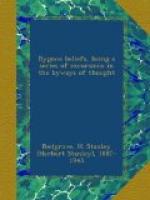The Pythagorean Order was broken up, but the bonds of brotherhood still existed between its members. “One of them who had fallen upon sickness and poverty was kindly taken in by an innkeeper.Before dying he traced a few mysterious signs [the pentagram, no doubt] on the door of the inn and said to the host: `Do not be uneasy, one of my brothers will pay my debts.’ A year afterwards, as a stranger was passing by this inn he saw the signs and said to the host: `I am a Pythagorean; one of my brothers died here; tell me what I owe you on his account.’ “[1]
[1] EDOUARD SCHURE: Op. cit., p. 174.
In endeavouring to estimate the worth of PYTHAGORAS’ discoveries and teaching, Mr FRANKLAND writes, with reference to his achievements in geometry: “Even after making a considerable allowance for his pupils’ share, the Master’s geometrical work calls for much admiration”; and, “. . . it cannot be far wrong to suppose that it was Pythagoras’ wont to insist upon proofs, and so to secure that rigour which gives to mathematics its honourable position amongst the sciences.” And of his work in arithmetic, music, and astronomy, the same author writes: “. . . everywhere he appears to have inaugurated genuinely scientific methods, and to have laid the foundations of a high and liberal education”; adding, “For nearly a score of centuries, to the very close of the Middle Ages, the four Pythagorean subjects of study—arithmetic, geometry, astronomy, music—were the staple educational course, and were bound together into a fourfold way of knowledge—the Quadrivium."[1] With these words of due praise, our present excursion may fittingly close.
[1] Op. cit., pp. 35, 37, and 38.
III
MEDICINE AND MAGIC
THERE are few tasks at once so instructive and so fascinating as the tracing of the development of the human mind as manifested in the evolution of scientific and philosophical theories. And this is, perhaps, especially true when, as in the case of medicine, this evolution has followed paths so tortuous, intersected by so many fantastic byways, that one is not infrequently doubtful as to the true road. The history of medicine is at once the history of human wisdom and the history of human credulity and folly, and the romantic element (to use the expression in its popular acceptation) thus introduced, whilst making the subject more entertaining, by no means detracts from its importance considered psychologically.
To whom the honour of having first invented medicines is due is unknown, the origins of pharmacy being lost in the twilight of myth. OSIRIS and ISIS, BACCHUS, APOLLO father of the famous physician AESCULAPIUS, and CHIRON the Centaur, tutor of the latter, are among the many mythological personages who have been accredited with the invention of physic. It is certain that the art of compounding medicines is extraordinarily




